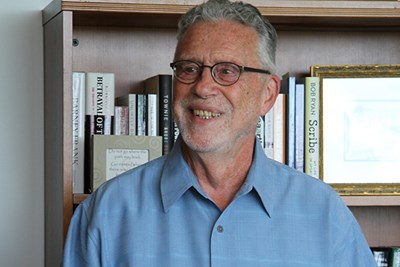University Prof. Robert Forrant Wins Grant for Summer Program
 Image by K. Webster
Image by K. Webster
08/03/2017
By Katharine Webster
Reynaldo Rivera, 12, is spending three weeks this summer surrounded by history. He’s a camper at the “Rising Loaves” writing and history program for Lawrence schoolchildren, started by University Prof. Robert Forrant and the Lawrence History Center.
“I like studying history, how it’s been in the past and how it can help us in the future,” says Rivera, a rising seventh-grader at UP Academy Oliver.
This is Rivera’s third year at the Lawrence Students Writing Project Rising Loaves camp. His small group usually meets in the blacksmith’s shop, where they crowd in with the anvil, the forge, a workbench and dozens of tools. He likes writing stories and poems, although he hasn’t yet found the courage to read his work aloud to the whole camp at the end of the day.
“It feels weird with the big group,” he says.
Rising Loaves is a free program for Lawrence schoolchildren from third grade through middle school. They do hands-on activities, explore the history center’s archives, take field trips and talk with local poets and artists. Every day, they write in small groups led by high school and college students, meeting in the center’s buildings – the stable, the blacksmith and carpenter shops, the cashier’s office and the research room – all in the former Essex Company mill complex, which is listed in the National Register of Historic Places.
 Image by K. Webster
Image by K. Webster
Initial funding for Rising Loaves was provided by the UMass President’s Office through a $20,000 Creative Economy Grant awarded to Forrant in 2015. A second $21,000 grant this spring doubled the number of children who can participate. The Creative Economy Fund awards grants to faculty for projects that benefit the state’s economy and improve quality of life.
Each year, the Rising Loaves camp has a different historical theme. This year’s is “Healthy Me, Healthy Lawrence,” with activities tying into the centennial of the Spanish flu epidemic that peaked in 1918, killing more than 2,000 city residents. About 15 middle school students will continue writing and studying history with Guerrero throughout the school year and then present their work at a history center symposium on the flu epidemic next April.
In the meantime, the summer campers are learning how to make healthy foods and doing activities involving exercise, mental health and healthy communities. During “choice” time, they can dance, play volleyball, scrapbook, weave or try theatrical improvisation.
 Image by K. Webster
Image by K. Webster
“The stuff that other people wrote, they’re not nervous to share, they’re happy to share,” she says. “And I’m meeting new kids.”
Eddin Macario, 10, who’s going into the fifth grade at Arlington Middle School, likes the hands-on activities and field trips. One goal of the program is to start the children thinking about college, and Macario was duly impressed by a visit to Northern Essex Community College, where the campers saw special classrooms for the nursing program featuring computer-controlled dummy “patients” in hospital beds.
Another day, the campers visited Ferrous Park, where the Spicket River flows into the Merrimack. It was the original site of the Lawrence Experiment Station, a lab dating back to 1887 where scientists pioneered methods of filtering river water and treating sewage to prevent the spread of diseases like typhoid and cholera. (A $22,182 Creative Economy Grant awarded to History Prof. Chad Montrie last year paid for educational signs at the park and lesson plans about the lab.)
 Image by K. Webster
Image by K. Webster
That inspired the students’ first book project, “How to Make Guacamole.” They will write and illustrate several books, which will be printed and distributed to pediatricians’ offices around the city for other children and families to read.
Rising Loaves lets children be creative and express themselves in a way that traditional schools don’t, says Brianna Anderson, a small-group leader and a recent graduate of Lawrence High School who is going to Pine Manor College to study psychology and expressive therapies. She’s a graduate of Andover Bread Loaf herself.
“Bread Loaf allowed me to write, allowed me to create and allowed me to express myself. I felt I was respected and loved,” she says. “Children need someone to tell them they’re doing something right and that you’re proud of them. They remember these things and carry them on and become great people.”




